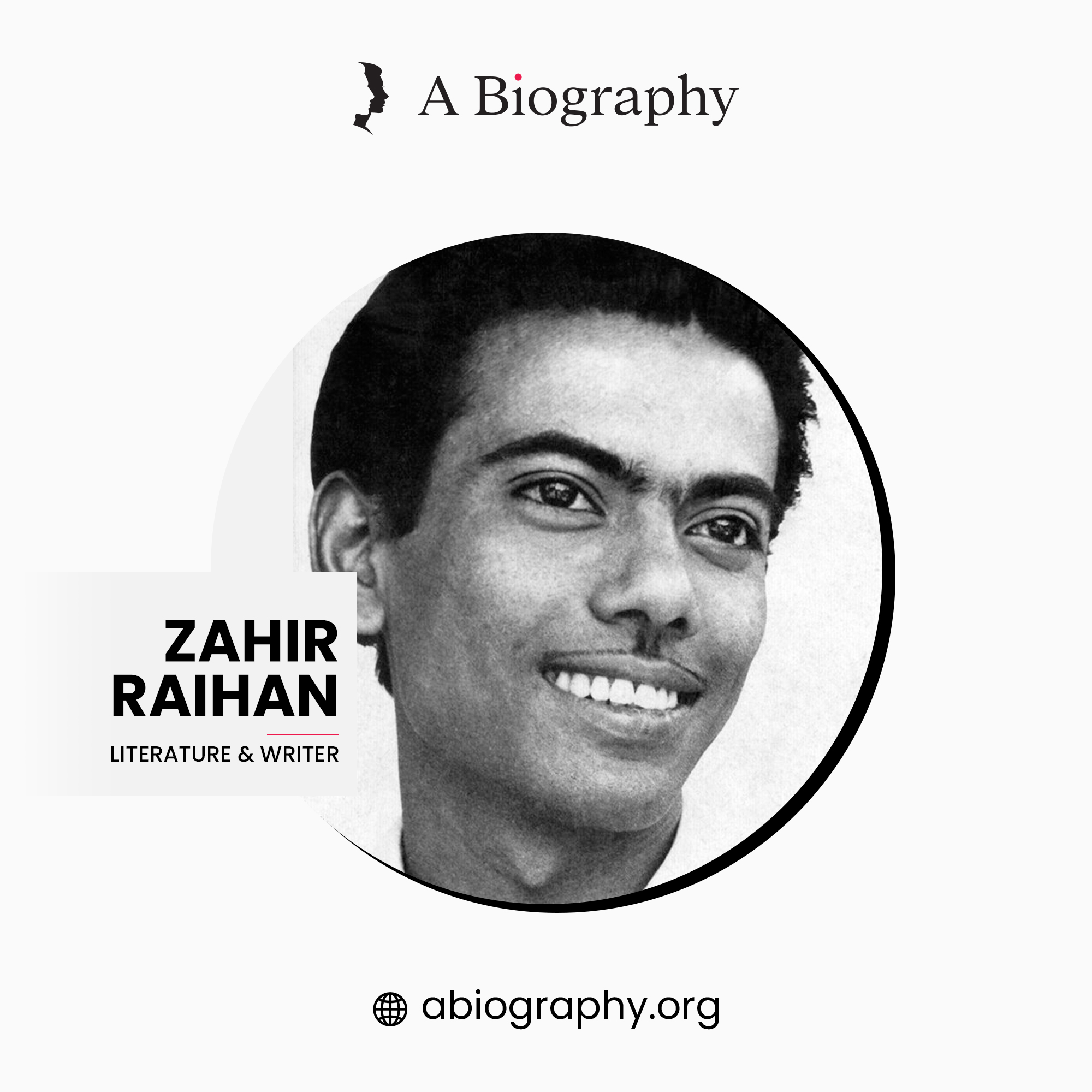BIOGRAPHY OF Zahir Raihan
(Bangladeshi writer, novelist and filmmaker)
(19 August 1935 – disappeared 30 January 1972)
A BIOGRAPHY OF ZAHIR RAIHAN
Raihan (19 August 1935 – disappeared 30 January 1972) his real name is Mohammad Zahirullah. He was a Bangladeshi novelist, writer, and filmmaker. He became popular for his documentary Stop Genocide (1971) during the war of independence in Bangladesh. The Bangladesh government awarded him the Ekushey Padak in 1977, and the Independence Day Award in 1992. He has received Adamjee Literary Award, Bangla Academy Literary Award (1972), and Bangladesh National Film Awards (1972).
Zaheer’s dream was to build a democratic society where freedom of speech and will would be guaranteed. He also had many dreams about Bengali films. In 1952, he made a legendary film based on the language movement, which was a true story of human life. It was a revolt against the then dictatorial government.
Table of Contents
ToggleLife of “Zahir Raihan” At a Glance:
Education:
University of Dhaka
Father: Mohammad Habibullah
Wife:
Sumita Devi
Shuchonda
Children: With Sumita he had two sons including
Bipul Raihan
Anol Raihan
With Shuchonda he had two sons including
Opu Raihan
Topu Raihan
Relatives: Shahidullah Kaiser (brother)
Disappeared: 30 December 1971
Awards:
Ekushey Padak
Independence Day Award
Adamjee Literary Award
Bangla Academy Literary Award
Bangladesh National Film Awards
Novels:
Shesh Bikeler Alo
Trishna
Hajar Bachhar Dhare
Arek Phalgun
Baraf Gala Nadi
Ar Kato Din
Kayekti Mrityu
Ekushey February
Short stories:
Sonar Harin
Shomoyer Prayojane
Ekti Jigyasa
Harano Balay
Badh
Poster
Demag
Swikriti
Aparadh
Ati Parichito
Early Life and Education:
Zahir Raihan was born on 19 August 1935 in the village of Feni sub-division (now Feni district) in Noakhali district. When the Partition of Bengal ended in 1947, he returned to his village from Calcutta with his parents. Zahir graduated in Bengali from Dhaka University. He also obtained a master’s degree in Bengali literature.
Career:
Besides his literary work, Zahir was also a journalist. In 1950 he joined the light of the age. Later he also worked in newspapers called Khapchhara, Janatrik, and Cinema. Then in 1956, he worked as the editor of Prabha. In 1955, his first short story, Suryagrahan, was published. In 1956, he worked as an assistant director in his first Urdu film, Jago Hua Savera. It was through this that his direct involvement with the film began. He assisted Salahuddin in the film “J River Marupathe”. He wrote the title song when filmmaker Ehtesham hired him for the film “A Desh Tomar Amar”. He made Sangam, the first color film made in Pakistan in 1964. The following year his first Cinemascope film excuse was completed. Zahir Raihan was an active supporter of the 1952 Bengali language movement. He was arrested on 21 February 1952 while attending a historic meeting in Amtala. In 1969 he took part in the mass uprising in East Pakistan. When the war of independence broke out in March 1971, Raihan made a documentary called Stop Genocide. Critic Ziaul Haque Swapan called the documentary history of Bangladeshi documentary, describing it as “a strong protest against the Pakistani army’s genocide in Bangladesh.” During the war, Zahir made a documentary called State Is Born. When he went to Calcutta during the conflict, a film from his life was shown there. Satyajit Ray, Ritwik Ghatak, Mrinal Sen, and Tapan Sinha were very appreciative of his films. At that time he was going through many financial crises. But even then he gave all his money from Calcutta to the Muktijoddha Trust.
Personal life:
Zahir was married twice in his life. In 1961, he married film actress Sumita Devi. Sumita had two sons, Bipul Raihan and Anol Raihan. In 1968, he married film actress Shuchanda. He also had two sons with Apu Raihan and Tapu Raihan.
Disappearance:
On December 30, 1971, when his brother Shahidullah Qaiser, a noted writer, was captured and killed by the Pakistani army or local allies in the last days of the war of liberation, Zahir suddenly disappeared. Everyone believes that Zahir died when armed Bihari allies and Pakistani army soldiers who were in hiding went to Mirpur, a suburb of the capital Dhaka, and opened fire on them.
Disclaimer:
All content on this website is provided in good faith and only for general information purposes. A Biography makes no guarantees regarding the information’s completeness, reliability, or correctness. Any action you take as a result of the material on this website is entirely at your own risk. A Biography is not responsible for any losses or damages incurred as a result of using our website.
এই ওয়েবসাইটের সমস্ত বিষয়বস্তু সরল বিশ্বাসে এবং শুধুমাত্র সাধারণ তথ্যের উদ্দেশ্যে প্রদান করা হয়েছে। একটি জীবনী তথ্যের সম্পূর্ণতা, নির্ভরযোগ্যতা বা সঠিকতা সম্পর্কে কোন গ্যারান্টি দেয় না। এই ওয়েবসাইটের উপাদানের ফলস্বরূপ আপনি যে কোনও পদক্ষেপ গ্রহণ করেন তা সম্পূর্ণরূপে আপনার নিজের ঝুঁকিতে। একটি জীবনী আমাদের ওয়েবসাইট ব্যবহার করার ফলে কোনো ক্ষতি বা ক্ষতির জন্য দায়ী নয়।

